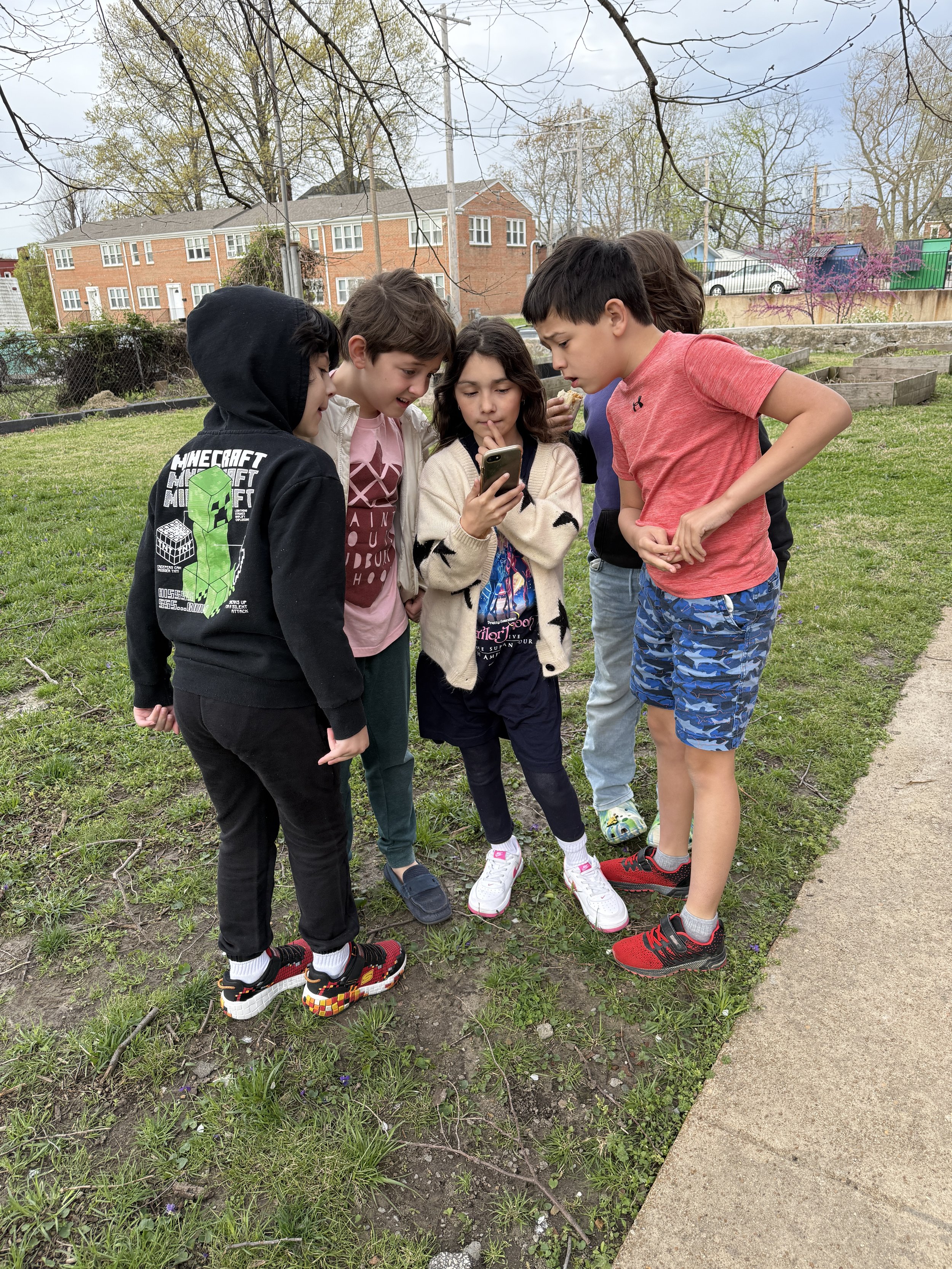Some Sudbury students, staff, and volunteers after a great conversation about personal tech use at school
Looking at photos and videos of a wild turkey we saw in the yard
A student giving a presentation about what he wanted to buy with School Meeting funds to build a computer for the school
““This is not just a school. It’s a community. What do we need? How can we work together to get things done?””
Students’ freedom to manage use of personal technology devices at Saint Louis Sudbury School is a big responsibility, as it is for any human inside and outside of school environments! At our school, we have content rules in place, but do not restrict the amount of time spent on personal devices currently. This has been an ongoing conversation and we have tried different approaches, rules, and policies over the years, some being more effective than others. What we have struggled with is coming to an agreement among School Meeting Members about why our community wants tech rules or policies and what are realistic ways to maintain any rules.
The possibility of changing our approach to personal device use at our school is on our radar again as we look to develop a more engaged community (with an eye on future growth!), but in a way where autonomy, trust, and respect can still thrive among all community members. And importantly, that we do not create feelings of shame, blame, and guilt around technology use.
Recently on an unusually chilly park day at Tower Grove Park, a small group of students, staff, and volunteers talked about intentional vs. habitual use of personal tech devices at Saint Louis Sudbury School. Here are some highlights from the discussion! Our group included students ages 9 to 17.
Sudbury students mentioned that habitual personal tech device sometimes causes them to feel mentally and physically awful, disappointed in themselves, and creates sleep disruptions. When intentionally using devices, people said that they felt accomplished, knowledgeable, calm, secure, could watch longer content, regulated, and found it easier to put the device away when they wanted to.
We talked about how seeing other students on personal devices frequently made them feel distracted, dysregulated, and bothered at all the noise—both background gaming sounds and people being loud out of excitement.
When asked WHY people are on their devices typically, students suggested that it was for fun, to pass time, because the person found something interesting, and because there was nothing else to do. A person in our group who is very familiar with the unique aspects of the Sudbury school model pointed out that sometimes boredom is a good thing and habitual device use doesn’t let that happen. All sorts of amazing things can happen when one is bored!
Our group chatted about how people felt when seeing someone very focused while looking at their personal tech device. We asked, “Do you feel okay about approaching that person and asking them if they want to do something?” Most students did not voice strong opinions in response to this question, but one mentioned that when they see their parent looking at their phone a lot, that they want to say, “Hey. I’m right here. I miss you.” And another said, “Sometimes it’s hard to see if people are okay if they’re on their phone all the time.”
We discussed why many schools throughout the country have been exploring this issue for years. Saint Louis Sudbury School students said that too much screen use can inhibit learning sometimes, that there are limits as to what humans can learn on a personal tech device, and that often young people are dealing with anxiety and depression from other things going on in their lives and using a phone or other personal device can be an escape in some ways. Also, gaming can be a place where people can feel like they’re in control and being in control lowers anxiety levels.
What are some alternatives to using personal tech devices all the time at Saint Louis Sudbury School? Students suggested that people could do things that they love like singing, making music, learning an instrument, drawing, playing board games, playing outside, baking, doing yoga, and much more.
Some of the Saint Louis Sudbury School teens shared how important it is to learn how to manage personal tech devices now so that they can handle it in adulthood.
Although many students in our conversation see that they enjoy using their personal tech devices more when it is intentional instead of habitual use, one person emphasized how a lot of usage of any kind can affect our school community. One student said, "It’s important that we develop a life outside of tech and learn how to be together. This is not just a school. It’s a community. What do we need? How can we work together to get things done?”
As we look at past and current methods and approaches that have already fostered community at Saint Louis Sudbury School and explore strategies we have yet to try, Sudbury students and staff look forward to beginning the process of creating an intentional tech use policy in the coming months. The young people at our school offer so much insight and thoughtfulness on this big issue—one that can stir up a lot of emotions and different viewpoints. Saint Louis Sudbury School students’ ability to problem solve, strategize, and empathize with each other continues to inspire our community!
#trustchildren #learningiseverywhere #stlsudbury
Watching The Gruffalo together
Watching a Zoom call with the Alliance for Self-Directed Education





